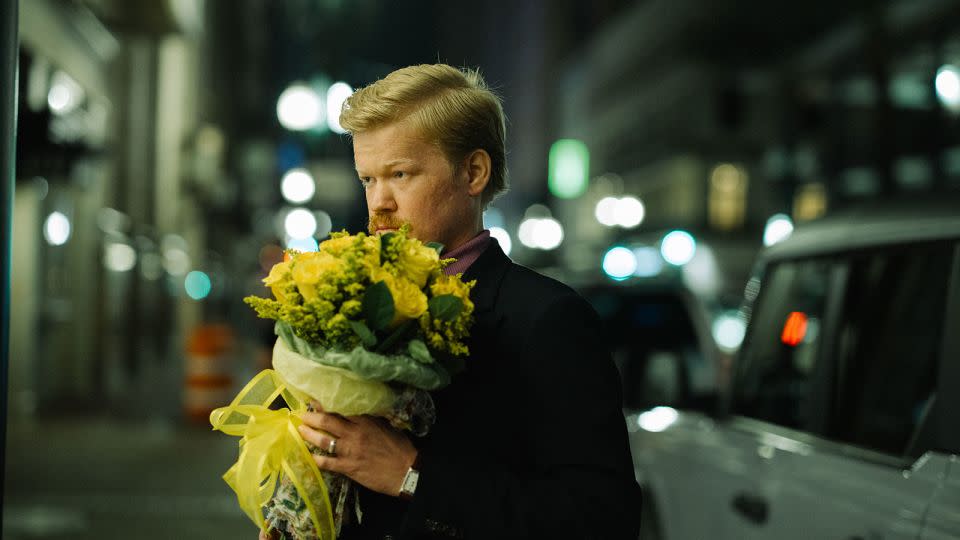Opinion: ‘Kinds of Kindness’ has a cultish take on toxic work culture
Editor’s Note: Noah Berlatsky is a freelance writer in Chicago. The views expressed here are solely the author’s. View more opinion articles on CNN.
Many people who are not corporate bosses agree that managers and corporations sometimes treat their employees badly to make more money. In his new film, “Kinds of Kindness,” though, Yorgos Lanthimos goes further. The movie suggests that workplace dynamics mirror those of a cult, and that bosses and their laborers are locked in a relationship of psychosexual dominance. To be an employee, Lanthimos suggests, is essentially to be in a cult.

An anthology of three short films, “Kinds of Kindness” makes its points elliptically, linked by the cast (Emma Stone, Jesse Plemons, Willem Dafoe, Margaret Qualley, Hong Chau, Joe Alwyn, Mamoudou Athie, Hunter Schafer) and recurrent themes of obsession and control. The third film is explicitly about a cult; members drink sacred water, avoid eating fish and can only have sex with the cult leaders. The second film is about an abusive marriage, in which the husband demands the wife perform ever more extreme acts of self-abnegation and mutilation.
The first film takes place on the job. Robert (Plemons) works at an undefined, vaguely corporate job for Raymond (Dafoe). His duties consist of doing everything Raymond says — wearing the clothes Raymond chooses, driving the car Raymond gives him, dating whoever Raymond picks out for him, having sex with Sarah (Chau), the wife Raymond chose for him, according to Raymond’s schedule, getting into potentially deadly car crashes if Raymond tells him to. Robert does balk at that last one, at which point Raymond fires him, and Robert’s life — held together by Raymond’s largesse and Raymond’s commands — spirals out of control.
The film is intentionally absurdist; bosses don’t really control every aspect of their employees’ lives. They don’t demand that employees endanger themselves. They don’t demand verbal declarations or displays of love. Right?
As soon as you ask the question, it’s clear that the answer is a lot more ambiguous than it should be. Raymond, for example, is obsessed with Robert’s weight (he thinks thin men are ridiculous). That interference in employee diets is mirrored in a lot of workplaces, which provide financial incentives — like lower health insurance premiums — if workers lose weight or exercise more, although these programs have been shown to be largely useless.

Similarly, when Raymond demands that Robert refrain from having children — even demanding that Robert deceive and medicate his own wife — the boss participates in a long tradition of workplace discrimination against, and termination of, pregnant women employees. And, of course, bosses often ask employees to risk their health and safety by, for example, forcing them to work in-person during a deadly pandemic.
Managers and employers can and do also interfere in ugly ways in their employees’ sex lives. Workplace harassment is a pervasive problem in a huge range of professions, from farm work to domestic labor to Hollywood itself. #MeToo gained prominence as a movement when Hollywood actors spoke out, alleging a pervasive culture of sexual harassment fostered by industry figures like producer Harvey Weinstein.
Raymond in many ways acts as a director of Robert’s life, telling him what to do, what to say, what to wear, what car to drive — and also making inappropriate sexual demands on him just as some powerful people in Hollywood have made inappropriate sexual demands on those over whom they hold sway.
We don’t know what Raymond’s business is, and it’s unclear whether or how Robert makes him money. But it’s clear that profit isn’t the main issue here. Instead, Raymond’s motivation appears to be that he simply likes making Robert (and his other minions) do his bidding.
And again, that dynamic has a ring of truth. Remote work saves companies money by reducing rent and relocation costs, and because workers who work from home are more satisfied with fewer pay raises. Yet, bosses like Jamie Dimon of JPMorgan and Elon Musk of Tesla say they prefer employees at the office because it promotes “hustle” or is more “hardcore.” Some bosses want to micromanage their employees because it gives them more power. Their workers have to perform diligence and toughness. That makes them feel diligent, tough, in control.
The fact that the Raymonds of the world have tough-guy fantasies about controlling the rest of us is unpleasant, but not exactly surprising. The really disturbing thing about Raymond and Robert’s relationship, though, is that Robert is every bit as invested in it as Raymond is. When Raymond isn’t telling him what to do, Robert is at sea; he can’t even figure out what wine to order at the bar.
Nor does Robert just want Raymond’s orders; he wants his love. Raymond kisses Robert on the lips before Robert is fired. Then, after Robert is rejected, he tries to kiss Raymond and is rebuffed — a scene echoed in the third film, when Emily (Stone) tries to kiss cult leaders Omi (Dafoe) and Aka (Chau) through a fence after she’s been exiled.
Many people, even most people, are not happy at work — in 2022 only a third of US workers reported feeling engaged at their job. Most people do not look to their bosses for personal guidance, much less affection. And yet, there is a religion of the boss and of the successful business guru. Former President Donald Trump’s mystique began with him touting himself, and being touted in the press and on reality television, as a successful businessman. Apple co-founder Steve Wozniak has said that Musk and Steve Jobs are treated by their fans in some respects as cult leaders.
If you criticize Trump or Musk, or any of the successful bosses Raymond is satirizing, a whole slew of social media Roberts will rush up to declare their undying allegiance to the cult and read you out of it.
Robert finds meaning and pleasure in clinging to Raymond’s power, even if that power is mostly the power to control and humiliate Robert. As in cults, or in situations of domestic abuse, prolonged emotional and psychological subjugation can lead people to lose their sense of self and their self-worth. People in “Kinds of Kindness” are pushed to mistake domination for kindness. Raymond and many bosses benefit.
For more CNN news and newsletters create an account at CNN.com


